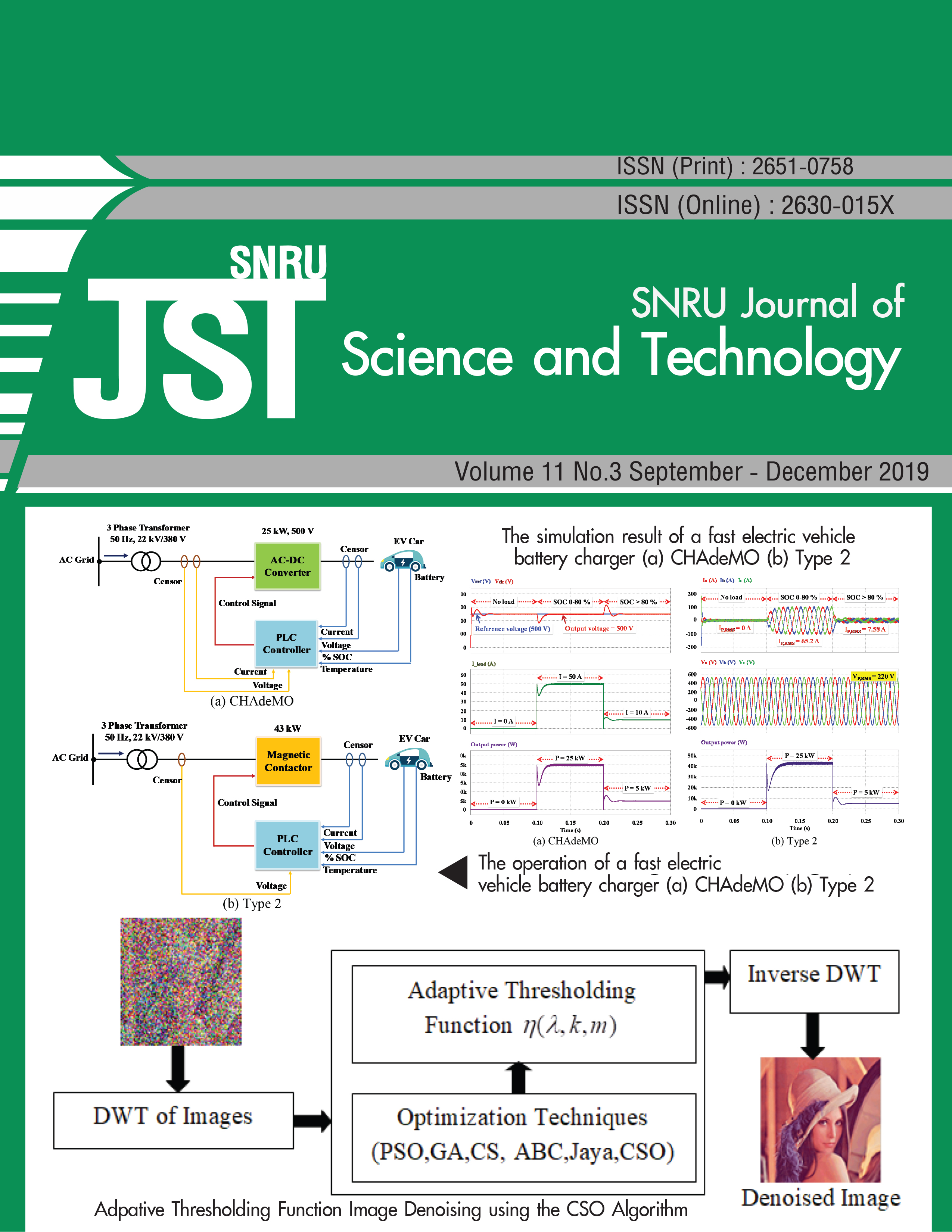The study and analysis of the impact on the power distribution system of the battery charger stations at Sakon Nakhon Rajabhat University
Keywords:
EV quick charge station, CHAdeMO standard, Type 2 standardAbstract
This article is presenting the study and analysis of the impact on the power distribution system of the battery charger stations at Sakon Nakhon Rajabhat University according to the problem of the difference between the plugs of electric car battery chargers at the battery charger station and the electrical receptacle of various types of electric vehicles which respond to the needs electric vehicles users that are currently in use. The proposed paper is introducing the electric vehicle battery charger principle, the design standard selection of the fast charge with various standard battery charger. Results are shown in simulation with the Power Simulation (PSIM) and the implementation of battery charger with various standard fast charge type which installed at Sakon Nakhon Rajabhat University. The results show that CHAdeMO and Type 2 can accommodate most of the electric vehicles currently in use. In addition, the operation of a fast-charge electric car battery charger can also help to prevent the deterioration of the battery. Due to the fast charging operation with voltage, current or unappropriated temperature, the charging process will not affect the power stability of the utility system and the system efficiency can be evaluated from the simulation and implementation results.
References
[2] H. Kato, R. Ando, Y. Kondo, T. Suzuki, K. Matsuhashi, S. Kobayashi, Comparative measurements of the eco-driving effect between electric and internal combustion engine vehicles, 2013 World Electric Vehicle Symposium and Exhibition (EVS27), 17 – 20 November 2013, 1 – 5.
[3] H.C. Righolt, F.G. Rieck, Energy chain and efficiency in urban traffic for ICE and EV, 2013 World Electric Vehicle Symposium and Exhibition (EVS27), Barcelona Spain, November, 2013.
[4] Peak demand of Thailand, Available Source : https://www.egat.co.th/index.php?
option=com_content&view=article&id=348&Itemid=116, 10 October 2018.
[5] K. Kim, T. Yoon, G. Byeon, H. Jung, H. Kim, G. Jang, Power demand and power quality analysis of EV charging station using BESS in MicroGrid, 2012 IEEE Vehicle Power and Propulsion Conference, 9 – 12 October, 2012. 996 – 1001.
[6] M. Meraj, A. Massoud, Dynamic mitigation of EV charging stations impact on active Distribution Networks with Distributed BESSs, Power Electronics and Power Engineering (CPE-POWERENG 2018), 10 – 12 April 2018, 1 – 6.
[7] Y.F. Huang, V. Gupta, Stochastic Dynamic Pricing for EV Charging Stations With Renewable Integration and Energy Storage, IEEE Transactions on Smart Grid. 9 (2018) 1494 – 1505.
[8] T. Kang, C. Kim, Y. Suh, H. Park, B. Kang, D. Kim, A design and control of bi-directional non-isolated DC-DC converter for rapid electric vehicle charging system, 2012 Twenty-Seventh Annual IEEE Applied Power Electronics Conference and Exposition (APEC), 5 – 9 February 2012, 14 – 21.
[9] P. Bauer, Yi Zhou, J. Doppler, N. Stembridge, Charging of electric vehicles and impact on the grid, 13th Mechatronika 2010, 2 – 4 June 2010, 121 – 127.
[10] M. Yilmaz, P.T. Krein, Review of Battery Charger Topologies, Charging Power Levels, and Infrastructure for Plug-In Electric and Hybrid Vehicles, IEEE TRANSACTIONS ON POWER ELECTRONICS. 28 (2013) 2151-2169.
[11] Electric Vehicle Charging Points, Available Source: http://www.evchargingpoint.co.uk/, 15 October 2018.
[12] ELECTRIC CAR CHARGING 101-TYPES OF CHARGING, CHARGING NETWORKS, APPS, & MORE!., Available Source : http://evobsession.com/electric-car-charging-101-types-of-chargingapps-more/, 24 October 2018.
[13] K. Prompinit, W. Kasemsin, The Study and Development of Multi-Standard for Electric Vehicle Quick Charging Station and Its Implication in Utility, Research project, Sakon Nakhon Rajabhat University, Sakon Nakhon, Thailand, 2018.









